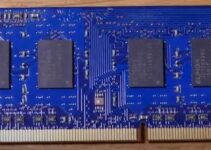Is 128GB RAM Enough for Doctors? The simple answer is yes because the question of whether a doctor needs more than 128 GB of RAM has been asked.
Doctors can also use 16 to 64 GB of memory, which readily satisfies their demands. However, some doctors prefer to work faster and take pleasure in their profession
To handle patient data, find medical information, and interact with colleagues, doctors significantly rely on technology.
With such a rigorous workload, having a computer that can keep up is essential. However, is 128GB RAM sufficient for a doctor’s needs? Let’s take a closer look at the response to this query.
RAM: Essential for Instant Medical Access
Random Access Memory, or RAM, is an essential part of every computer system. It is responsible for temporarily storing data that the computer is currently using to facilitate quicker access and processing.
For medical professionals, this means having instant access to patient records, scientific data, and other crucial information without any lag or delays.
Although some doctors may not require more than 128GB of RAM, it ultimately depends on the demands of their workload and the applications they utilize.
To choose the right quantity of RAM for your requirements, it’s crucial to speak with a computer professional.
Key Factors for Medical Computer Selection
When selecting a computer for your medical business, memory is just one of many key factors to take into account. Storage space and processor speed are also important factors to consider.
A quick processor can make it easier for you to run many programs simultaneously, and enough storage capacity guarantees that you can keep all of your crucial files and data without running out of room.
To ensure that you have a computer that can handle your demanding tasks, it’s crucial to consider all these elements when making a purchase.
Importance of Sufficient RAM for Doctor Laptops

Working with patient information, medical images, and scientific research can be challenging for medical personnel. Efficient data processing requires a machine with enough RAM.
Doctor laptops with more RAM can process data faster, improving productivity and ultimately leading to better patient care.
Medical workers may also use electronic health record systems and medical imaging software, which demand additional RAM to operate smoothly.
However, it’s important to note that the performance of a computer system is affected by not just the amount of RAM, but also the CPU and storage components.
Minimum Required RAM for a Doctor’s Laptop

The minimum amount of RAM for a doctor’s laptop depends on their needs, the software and programs they use, and their budget. However, a doctor’s laptop should have at least 8GB of RAM.
With 8GB of RAM, a doctor’s laptop can run basic programs and medical software smoothly, as well as handle basic picture processing and file management.
However, more advanced medical imaging software and electronic health record systems may require a doctor’s laptop with 16GB or 32GB of RAM for optimal performance.
Radiologists and oncologists, who work with large files and high-resolution images, may require this.
In addition, more RAM can improve multitasking, allowing medical professionals to run multiple programs at once.
Ultimately, the amount of RAM a doctor’s laptop requires depends on their specific needs and budget. They may need more than 8GB of RAM for maximum performance and productivity.
Advantage of 128gb RAM in a Doctor’s Laptops

A medical laptop with 128GB of Memory can provide a number of benefits, including:
- Faster data processing: A laptop with a lot of RAM will be able to process data more rapidly, which can enhance productivity and save time.
- Better multitasking: Medical practitioners frequently need to run many programmes at once. The laptop’s 128GB of RAM can easily handle these programmes without stuttering or crashing.
- Larger file management: The laptop can handle larger files, such as research data and medical photos, without any lag or interruption thanks to its 128GB of RAM.
- AI language processing: The laptop’s 128GB of RAM can perform difficult AI language processing activities, like machine learning and natural language processing, which can be helpful for conducting and analysing medical research.
- Future-proofing: A laptop with 128GB of RAM is capable of handling any upcoming software and technological updates without experiencing any problems.
Disadvantage of 128gb RAM in a Doctor’s Laptops
- 128GB of RAM in a doctor’s laptop is a very high number and may not necessarily have any drawbacks as an AI language model.
- One drawback of a laptop with 128GB of Memory is its cost. It will likely cost more than a laptop with less RAM.
- 128GB of RAM could be unnecessary and overkill for some medical professionals, leading to overspending on extra features.
- Increased power consumption and heat production are potential drawbacks that can impact the laptop’s performance and battery life.
Conclusion
In conclusion, whether a doctor’s laptop needs 128GB of RAM or not will ultimately depend on their workload and the software they use.
Instant medical access requires sufficient Memory, and better patient care relies on computers that can handle the demanding tasks that doctors perform.
When choosing a computer, important factors like storage capacity and processing speed should also be taken into consideration.
While having 128GB of RAM can offer advantages like faster data processing, better multitasking, and AI language processing, it can also come with disadvantages like higher cost and power usage.
At a minimum, a doctor’s laptop should have 8GB of RAM, but more advanced medical imaging applications and electronic health record systems may require more for optimal performance.
FAQs About Is 128GB RAM Enough for Doctors?
I need to know how much RAM I need for medical school?
The absolute bare minimum hardware requirements are a 13-inch display, an Intel Core Duo processor running at 1.4 GHz, 16 GB of RAM, and a 500 GB hard drive.
How much RAM does a college student studying medicine require?
The recommended minimum for the majority of programs is at least 8GB of RAM, which is measured in GB. If you can purchase 16GB, you can be confident that your computer will have enough RAM to handle a sizable number of tasks. The next step is 32GB, which is typically advised for doctors and college-age medical students.
What amount of RAM is required for data science?
A minimum of 8GB of RAM is needed for data science; any less will make it difficult to create many of the most cutting-edge models currently available. You may always upgrade to 64GB or more, although this is frequently unnecessary and excessive. But, there are several more factors to think about while making your purchase.
How much RAM is recommended for doctors?
8GB of RAM is more than plenty for medical specialists or medical students. However, students that consume a lot of data should consider getting at least 16GB of RAM. For daily productivity, 8GB of RAM is plenty. If you process a lot, consider upgrading to 16GB or more.
Read More:



